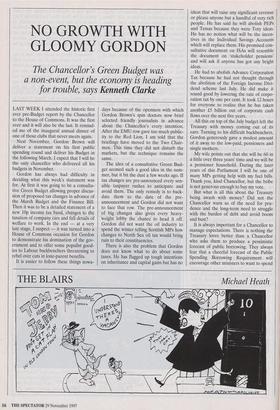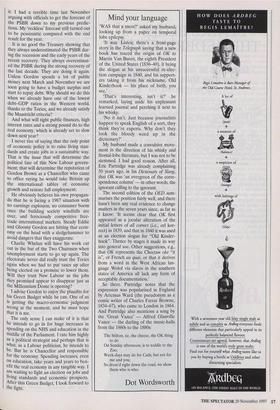NO GROWTH WITH GLOOMY GORDON
The Chancellor's Green Budget was a non-event, but the economy is heading
LAST WEEK I attended the historic first ever pre-Budget report by the Chancellor to the House of Commons. It was the first ever and it will also be the last. It remind- ed me of the inaugural annual dinner of one of those clubs that never meets again.
Next November, Gordon Brown will deliver a statement on his first public spending round and deliver his Budget in the following March. I expect that I will be the only chancellor who delivered all his budgets in November.
Gordon has always had difficulty in deciding what this week's statement was for. At first it was going to be a consulta- tive Green Budget allowing proper discus- sion of proposed tax changes in advance of the March Budget and the Finance Bill. Then it was to be a detailed statement of a new 10p income tax band, changes to the taxation of company cars and full details of welfare to work. In the end — at a very late stage, I suspect — it was turned into a House of Commons occasion for Gordon to demonstrate his domination of the gov- ernment and to offer some populist good- ies to Labour backbenchers threatening to rebel over cuts in lone-parent benefits.
It is easier to follow these things nowa- days because of the openness with which Gordon Brown's spin doctors now brief selected friendly journalists in advance about the Chancellor's every intention. After the EMU row gave too much public- ity to the Red Lion, I am told that the briefings have moved to the Two Chair- men. This time they did not disturb the markets, but the technique remains the same.
The idea of a consultative Green Bud- get seemed such a good idea in the sum- mer, but it bit the dust a few weeks ago. If tax changes are pre-announced every sen- sible taxpayer rushes to anticipate and avoid them. The only remedy is to back- date them to the date of the pre- announcement and Gordon did not want to face that row. The pre-announcement of big changes also gives every heavy- weight lobby the chance to head it off. Gordon did not want the oil industry to spend the winter telling Scottish MPs how changes to North Sea oil tax would bring ruin to their constituencies.
There is also the problem that Gordon does not know what to do about some taxes. He has flagged up tough intentions on inheritance and capital gains but has no ideas that will raise any significant revenue or please anyone but a handful of very rich people. He has said he will abolish PEPs and Tessas because they were Tory ideas. He has no notion what will be the incen- tives in the Individual Savings Accounts which will replace them. His promised con- sultative document on ISAs will resemble the document on 'stakeholder pensions' and will ask if anyone has got any bright ideas.
He had to abolish Advance Corporation Tax because he had not thought through the abolition of the Foreign Income Divi- dend scheme last July. He did make it sound good by lowering the rate of corpo- ration tax by one per cent. It took 12 hours for everyone to realise that he has taken another £5 billion out of corporate cash flows over the next five years.
All this on top of the July budget left the Treasury with money coming out of its ears. Turning to his difficult backbenchers, Gordon generously gave a modest amount of it away to the low-paid, pensioners and single mothers.
My wife points out that she will be 60 in a little over three years' time and we will be a pensioner household. During the later years of this Parliament I will be one of many MPs getting help with my fuel bills. Thank you, kind Chancellor, but the bribe is not generous enough to buy my vote.
But what is all this about the Treasury being awash with money? Did not the Chancellor warn us of the need for pru- dence and the long-term need to struggle with the burden of debt and avoid boom and bust?
It is always important for a Chancellor to manage expectations. There is nothing the Treasury loves better than a Chancellor who asks them to produce a pessimistic forecast of public borrowing. They always fear that a cheerful forecast of the Public Spending Borrowing Requirement will encourage other ministers to want to spend it. I had a terrible time last November arguing with officials to get the forecast of
the PSBR down to my previous predic- tions. My 'reckless' forecast still turned out to be pessimistic compared with the end result for the year.
It is no good the Treasury showing that they always underestimated the PSBR dur- ing the recession and the early years of the recent recovery. They always overestimat- ed the PSBR during the strong recovery of the last decade. They are doing it again.
Unless Gordon spends a lot of public money next March and November we are soon going to have a budget surplus and start to repay debt. Why should we do this when we already have one of the lowest debt—GDP ratios in the Western world, thanks to the Tories, and we already satisfy the Maastricht criteria?
And what will tight public finances, high interest rates and a strong pound do to the real economy, which is already set to slow down next year?
I never tire of saying that the only point of economic policy is to raise living stan- dards and create jobs in a sustainable way.
That is the issue that will determine the political fate of this New Labour govern- ment; that will determine the reputation of Gordon Brown as a Chancellor who came to office saying he would take Britain up the international tables of economic growth and restore full employment.
He obviously believes his own propagan- da that he is facing a 1987 situation with no earnings explosion, no consumer boom once the building society windfalls are over, and ferociously competitive free- trade international markets. Steady Eddie and Gloomy Gordon are hitting that econ- omy on the head with a sledgehammer to avoid dangers that they exaggerate.
Charlie Whelan will have his work cut out in the bar of the Two Chairmen when unemployment starts to go up again. The electorate never did really trust the Tories again when we had to put taxes up after being elected on a promise to lower them. Will they trust New Labour as the jobs they promised appear to disappear just as the Millennium Dome is opening?
I advise Gordon to enjoy the plaudits for his Green Budget while he can. One of us is getting the macro-economic judgment wrong at the moment, and he must hope that it is me.
The only sense I can make of it is that he intends to go in for huge increases in
spending on the NHS and education in the middle of the Parliament. I rate him highly as a political strategist and perhaps that is what, as a Labour politician, he intends to be. But he is Chancellor and responsible for the economy. Spending increases, even en education, take years and years to ben- efit the real economy in any tangible way. I am waiting to fight an election on jobs and living standards and economic prospects. After this Green Budget, I look forward to the fight.



















































































 Previous page
Previous page